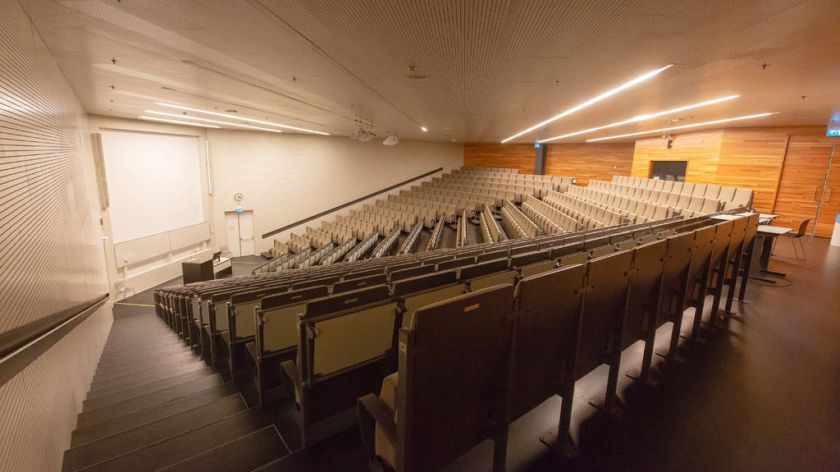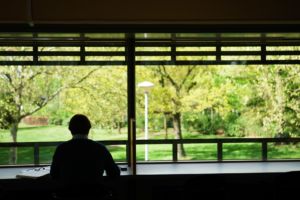-
 An empty lecture hall in the Grotius building. Photo by Dick van Aalst
An empty lecture hall in the Grotius building. Photo by Dick van Aalst
It has been possible for some time now to attend lectures in-person again, but a lot of lecture halls remain worryingly empty. Is this an issue? And what can the university do to lure students back to campus? ‘The campus has become less appealing.’
‘What is going on at universities post-corona?’ Thomas Vissers asked on Twitter. ‘Me and three other students just got ice cream from our lecturer as a reward for showing up to the lecture.’
Those attending lectures in-person likely find the Physics- and Philosophy student’s question very familiar. It hasn’t been very crowded on campus since the start of the pandemic, while in December the CBS found that over half of students in academic higher education miss a return to in-person classes.
‘A shame’, Vissers says of the low turnout. ‘If more students are present, that results in interesting discussions and classes can be very fun. I also think it’s sad for the teachers; they’re doing their best.’
Mandatory Attendance
From a social perspective, in-person lectures are indeed the best form of education, according to Andreas Galipo, student psychologist at Radboud University. He states that it is especially important to get first- and second year students back into the lecture halls. ‘It always takes some time for behavior to return to normal, but this group of students have never experienced ‘normal’ studying.’ I think it would be difficult to enforce a strict mandatory attendance policy, but motivating students to come to campus is not a bad thing.’
‘You’re confronted with different opinions in the lecture hall’
Diede van der Vleuten, a second-year student of Biology and Psychology, does not attend a lot of in-person classes and does not support a mandatory attendance policy. ‘We’re university students and I think that comes with personal responsibility. I understand that it is less fun for professors to teach in front of a nearly empty classroom, but I don’t think mandatory attendance is a good solution. That won’t help to make in-person lectures more appealing.’ According to Van der Vleuten, making lectures more interesting would be more effective. ‘There is often very little creativity involved.’
Thomas Vissers does not quite agree. ‘Take the lecture I mentioned in my tweet, for example; that was incredibly interesting. But there are plenty other advantages: lecturers are more approachable with questions; you make new friends; you can interpret body language -which improves communication- ; and you’re confronted with differing opinions. That makes you reflect more; I think that’s very important.’
Studying in the Future
Van der Vleuten thinks it’s a major misconception that students who don’t attend lectures are unmotivated. ‘That is definitely not the case. When I re-watch lectures, I can understand the lecture material much more clearly. This is because I can pause the recording and make better summaries.’
It also makes it easier for students to have a job. ‘Especially now that everything’s getting more expensive, a lot of students really need that time; you can re-watch lectures whenever it suits you’, according to Van der Vleuten. ‘In my experience, students who don’t attend in-person activities, do so because it’s more convenient for them. They do invest the time in studying, just at a different moment.
Social Inclusion
In its new campus plan, the University takes into account that education will become a mix of in-person and digital classes. The pandemic has changed the way studying works, and it is very difficult to reverse that process, says student psychologist Galipo. According to him, this is not necessarily an issue, just like how working from home needn’t be an issue.
But it does become problematic if this causes students to miss out on connecting with their fellow students. In his office, Galipo often hears complaints about a lack of contact, even more than before the pandemic. Van der Vleuten recognizes those complaints. During the first year of her studies, she barely got to know her classmates, which did not help her motivation to attend lectures.
‘The campus has become less appealing’
That is why the issues is not just with students, but with the university as well, according to Vissers. The student says that the facilities on campus have deteriorated since the corona crisis, making the campus less appealing. ‘They’re minor issues, but take the Refter, for example. It was always full, the building was open late, and there was a barista. Now their opening hours are very limited and there’s a coffee machine with buttons. The vitality has been taken away.’
Van der Vleuten thinks that the campus could also be made more active through smarter scheduling. ‘I always attend the lectures on embryology, because immediately afterwards there’s a practicum where you need to use the information from the lecture.’ Her other program in Psychology does things differently; lectures are posted online at the end of the week. ‘That can be just enough to convince people to attend. You don’t need to make radical changes to get students back into the lecture halls.’




